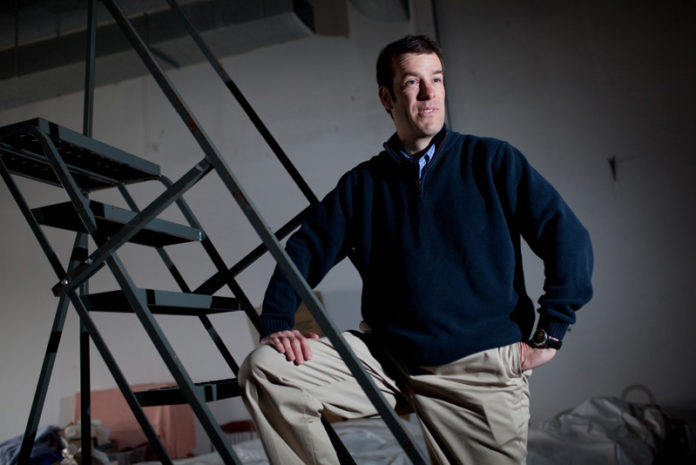It’s been one agonizing year for Middletown acupuncturist Seth Bock, leader of one of the three groups chosen to open Rhode Island’s first medical-marijuana dispensaries.
A month after they were selected over 18 other applicants, Bock and the other prospective compassion-center providers were warned by the U.S. Attorney’s office that Rhode Island’s medical-marijuana law did not protect them from federal prosecution. Last May, Gov. Lincoln D. Chafee put the brakes on licensing the compassion centers, casting them into legal and operational limbo, based on concerns that the dispensaries would be raided and their ailing patients arrested by federal agents.
“It has been hard to justify doing a lot given the uncertainty,” Bock said last month while waiting for a legislative fix to the deadlock over compassion centers. “So we put everything on hold and are ready to pick up the pieces if we hear good news.”
That news came March 1 when Chafee endorsed bills that would make a series of changes to Rhode Island’s medical-marijuana law intended to protect the compassion centers from federal prosecution and pave the way for them to be licensed.
But the changes laid out in the proposed bills suggest selling medical marijuana might not be as lucrative as some imagined, and the federal government feared, when Rhode Island’s medical-marijuana law was first passed.
One of the biggest changes in the bill would subject the three dispensaries to limits set by the R.I. Department of Health on how much marijuana they can grow, hold and sell.
What those limits will be is unclear, as the bill does not specify and the health department did not have any size limits ready to go when Chafee said he would support it.
Whatever the limits are, they will likely make it difficult for compassion centers to grow into the lucrative and powerful “large-scale, privately operated, industrial marijuana-cultivation centers,” that U.S. Deputy Attorney General James M. Cole said federal authorities were concerned about in a June memo.
The memo was designed to refute the idea, which grew out of a 2009 brief from U.S. Deputy Attorney General David W. Ogden, that federal authorities will not prosecute medical-marijuana distributors in states that have passed laws allowing it.
The memo also referred to recent state laws authorizing medical-marijuana use where dispensaries have issued “revenue projections of millions of dollars based on the planned cultivation of tens of thousands of cannabis plants.”
The reference appeared to reflect projections from Rhode Island’s three approved dispensaries where one, the planned Summit Medical Compassion Center in Warwick, estimated revenue of $23.4 million within three years of opening.
“That was never going to happen,” said JoAnne Leppannen, executive director of the Rhode Island Patient Advocacy Coalition about some of the sales estimates.
The Thomas Slater Compassion Center in Providence projected revenue of $3.6 million in three years and Bock’s GreenLeaf Compassionate Care Center estimated revenue of $1.2 million in three years.
Leppannen noted that many people have based their expectations for Rhode Island compassion centers on the more free-wheeling California experience.
“We have such a different culture here,” she said. “We are very disciplined.”
Most of the country’s drug laws are enforced at the state level, and both the Cole and Ogden memos said federal authorities would focus their limited resources on major traffickers and not individual medical-marijuana users or caregivers.
According to the authors of the proposed compassion-center bills, with their size limited, Rhode Island’s dispensaries are unlikely to be targets of federal prosecution.
In addition, the bills would require all compassion centers to register as official tax-exempt institutions instead of just being a “nonprofit” entity as the original law said.
“I think a lot of the fear from the federal government was the size of the proposals, the large revenue numbers that had come out,” said Rep. Scott Slater, D-Providence. “By keeping them smaller operations that are regulated and where patients can obtain medicine safely, I think it should satisfy those concerns.”
There are currently 2,822 registered caregivers and 4,416 registered medical-marijuana patients in the state, according to the health department, up from approximately 2,300 registered last March.
Despite efforts on the state level to more-finely tailor the medical-marijuana law to avoid federal conflict, U.S. Attorney for Rhode Island Peter F. Neronha has made no indication that the changes will make any difference.
“We have not nor do we intend to review or discuss legislation on this topic which, according to media reports, was recently submitted for consideration by the Rhode Island legislature,” Neronha said in a March 5 statement on the issue.
Although Chafee supports the bills, he has not explicitly said he will allow the issuance of dispensary licenses once the bills are approved. Sen. Rhoda Perry, D-Providence and Slater, the bill sponsors, have said they support allowing the three groups previously chosen to open the first dispensaries.
How long it will take the health department to set new regulations is another question, as is the readiness of the three selected compassion-center operators.
While Bock said he is ready to start work if a legal solution is passed, Providence Business News was not able to reach representatives of the other two compassion centers selected.
At GreenLeaf, Bock has held off on buying all the equipment he needs, but has been paying rent and electricity on the building he plans to locate the dispensary in and has created a website.
“All I can do is think about the people I have worked with as a practitioner and have really benefited from this,” Bock said. “For those people there is no alternative, and when you meet someone who has end-stage cancer and nothing else works, you will do anything.” •
No posts to display
Sign in
Welcome! Log into your account
Forgot your password? Get help
Privacy Policy
Password recovery
Recover your password
A password will be e-mailed to you.












